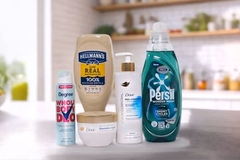September in review: WHO marks sunscreen essential, US FDA adverse event platform, AI transforms beauty
Key takeaways
- The WHO officially recognized sunscreen as an essential medicine, which could expand global access and reduce UV-related diseases.
- The US FDA launched a public dashboard for reporting cosmetic adverse events in a move to foster greater industry transparency.
- Generative AI is transforming beauty brand discovery, with experts warning companies that fail to adapt risk losing visibility.

Last month in industry news, the World Health Organization (WHO) updated its Model List of Essential Medicines to include sunscreen.
The US FDA opened a public adverse event reporting dashboard for cosmetics to increase transparency. Colgate-Palmolive agreed to change the marketing of its children’s toothpaste after the US Texas Attorney General called its fluoride advertising “misleading and dangerous.”
Also in the US, California was the first state to ban plastic microbeads in leave-on personal care products.
Spate’s September 2025 report found that generative AI is transforming search for beauty brands. We spoke to Iced Media about how companies that do not expand their discovery strategies into platforms like ChatGPT risk becoming “invisible.”

Summer beauty trends: Food-inspired formulations heat up
This summer, the beauty industry dished out a wave of food-inspired products. Gourmand-inspired beauty is not new, but it undoubtedly experienced a standout surge this summer. Brands tapped into the flavors, textures, and sensory appeal of food to mirror those same indulgent experiences in cosmetics. We spoke to Lush and Tara Formula about how the trend reflects consumers’ craving for familiarity. 1.webp) Trivium Packaging shows how metal boosts beauty product protection.
Trivium Packaging shows how metal boosts beauty product protection.
California becomes first US state to ban cosmetic plastic microbeads and glitter
California became the first US state to ban plastic microbeads in leave-on personal care and cleaning products. The US banned plastic microbeads in rinse-off cosmetics in 2015, however, they are still permitted in leave-on products. California also prohibited selling cosmetics containing plastic glitter, which will take effect in 20230. We spoke to Assembly member Tasha Boerner about how California may lead the way for other states.
WHO recognizes sunscreen as essential medicine
The WHO added sunscreen to its Model List of Essential Medicines, recognizing it as a crucial preventive medicine. The list guides countries in identifying the most vital health products for their populations. Sunscreen is now recognized alongside treatments for infectious diseases and chronic conditions. Learn more about how the classification aims to improve access and reduce UV-related diseases globally.
US FDA opens public portal for reporting cosmetic adverse events
The US FDA launched a public dashboard, giving consumers “real-time” access to reported adverse events from cosmetics. The move aims to increase transparency and is part of the FDA’s modernization strategy under the Modernization of Cosmetics Regulation Act of 2022. However, the FDA notes that the accounts are not verified and do not confirm a product’s safety risk.
Goodbye Google? Generative AI emerges as “beauty’s new SEO”
Social media and AI-powered tools are changing the way beauty consumers find brands. According to Spate’s September 2025 report, generative AI search has “transformed information discovery,” as it yields results as fast as traditional Google search. The beauty market researcher describes generative engine optimization as “beauty’s new SEO,” but says many brands are still trapped in legacy thinking. Emily Rose Campbell, head of performance at Iced Media, told us that beauty businesses failing to expand their discovery strategies into platforms like ChatGPT, TikTok, and Reddit may risk becoming “invisible.”  (1) 1.webp) Greenitio highlights chitosan-based derivatives as sustainable alternatives to petrochemicals.
Greenitio highlights chitosan-based derivatives as sustainable alternatives to petrochemicals.
Lush discusses fair trade cocoa partnership for peace in conflict areas
Lush Cosmetics has sourced fair trade cocoa beans through an ongoing strategic partnership with The Peace Community of San José de Apartadó, Colombia. Personal Care Insights sat down with Lush representatives to discuss the challenges of sourcing from the tumultuous region. They told us about recent quality and availability issues with the cocoa beans.
Colgate agrees to alter toothpaste packaging after Texas AG probe
Colgate-Palmolive agreed to change the marketing of its children’s toothpaste after US Texas Attorney General Ken Paxton called its fluoride advertising “misleading and dangerous.” Paxton alleged that the companies’ fluoride toothpaste packaging displayed more than the recommended amount. Starting in November, the company will depict a “pea-sized” amount of toothpaste on packaging. The move comes amid mounting scrutiny of fluoride’s potential risks to children’s health.
Natura sets full focus on Latin America and sells Avon International
Natura agreed to sell Avon International to Regent so that it can fully focus on its Latin American operations. Selling Avon International is part of the company’s simplification strategy. The buyer will take over the business in Europe, Asia, and Africa. The Brazilian company will retain control of the region’s intellectual property rights and brand management. Avon Russia was not included in this agreement but is still classified as “held for sale.”
EU pressured to uphold cruelty-free cosmetics amid regulatory revisions
Members of the European Parliament and NGOs urged the European Commission to strengthen bans on cosmetic animal testing. The representatives also called for greater support of cruelty-free innovation. The appeal came ahead of potential revisions to EU chemical and cosmetics regulations. In an open letter, the signees requested a demonstrable change toward removing animal testing, as signified in the Commission’s roadmap, and asked politicians to keep their “promise.” (2) 1.webp) Canada released its final animal testing strategy, but Cruelty Free International warns it lacks commitment.
Canada released its final animal testing strategy, but Cruelty Free International warns it lacks commitment.
Skin in the game: CTIBiotech pioneers “monumental leap” for cosmetics testing
CTIBiotech presented its lab-grown, computer-connected bioprinted skin at the IFSCC 2025 Congress in Cannes, France. The primary purpose of lab-grown skin is to reduce reliance on animal testing while enhancing the accuracy and speed of cosmetics and fragrance testing processes. CEO Dr. Nico Forraz told us that the innovation includes a functional sensory nervous system, replicating human skin. The company was awarded “Cosmetic Scientist” at the congress for its tech innovation.













